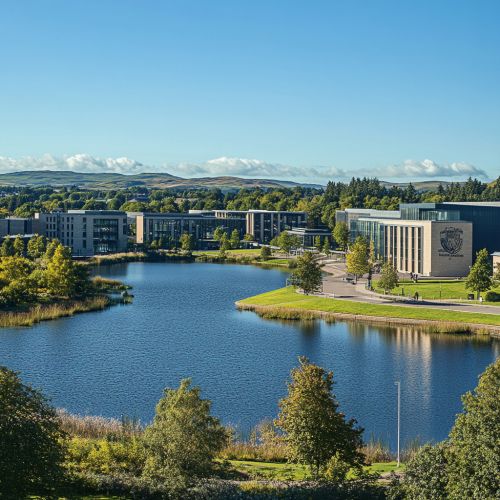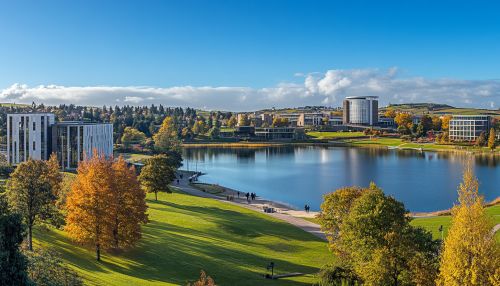University of Stirling: Difference between revisions
No edit summary |
No edit summary |
||
| Line 9: | Line 9: | ||
The University of Stirling is renowned for its stunning campus, which spans 330 acres and includes a loch, a golf course, and the Wallace Monument in the backdrop. The campus is often cited as one of the most beautiful in the world, offering a blend of modern architecture and natural beauty. The design of the campus was influenced by the principles of [[modernist architecture]], with a focus on functionality and integration with the natural environment. | The University of Stirling is renowned for its stunning campus, which spans 330 acres and includes a loch, a golf course, and the Wallace Monument in the backdrop. The campus is often cited as one of the most beautiful in the world, offering a blend of modern architecture and natural beauty. The design of the campus was influenced by the principles of [[modernist architecture]], with a focus on functionality and integration with the natural environment. | ||
[[Image:Detail-98567.jpg|thumb|center|A panoramic view of the University of Stirling campus, featuring the loch, modern buildings, and surrounding greenery.]] | [[Image:Detail-98567.jpg|thumb|center|A panoramic view of the University of Stirling campus, featuring the loch, modern buildings, and surrounding greenery.|class=only_on_mobile]] | ||
[[Image:Detail-98568.jpg|thumb|center|A panoramic view of the University of Stirling campus, featuring the loch, modern buildings, and surrounding greenery.|class=only_on_desktop]] | |||
Key architectural highlights include the Pathfoot Building, which was the first building to be completed on campus and is now a listed building. The university has continued to expand its facilities, with recent additions including the INTO Stirling Building and the Campus Central development, which aim to enhance student experience and support services. | Key architectural highlights include the Pathfoot Building, which was the first building to be completed on campus and is now a listed building. The university has continued to expand its facilities, with recent additions including the INTO Stirling Building and the Campus Central development, which aim to enhance student experience and support services. | ||
Latest revision as of 06:32, 19 October 2024
History
The University of Stirling was established by Royal Charter in 1967, making it one of the newer universities in Scotland. It was founded with a vision to provide innovative and interdisciplinary education, a goal that has been central to its mission since inception. The university was the first genuinely new university in Scotland for over 400 years, and it was designed to break away from the traditional university model. The campus was built on the Airthrey Estate, which included the historic Airthrey Castle, providing a picturesque setting for the institution.
The university's founding principal, Tom Cottrell, played a pivotal role in shaping its early years. Under his leadership, Stirling adopted a modular degree system, which was a novel concept at the time. This system allowed students greater flexibility in their studies, a feature that has become a hallmark of the university's academic offerings.
Campus and Architecture
The University of Stirling is renowned for its stunning campus, which spans 330 acres and includes a loch, a golf course, and the Wallace Monument in the backdrop. The campus is often cited as one of the most beautiful in the world, offering a blend of modern architecture and natural beauty. The design of the campus was influenced by the principles of modernist architecture, with a focus on functionality and integration with the natural environment.


Key architectural highlights include the Pathfoot Building, which was the first building to be completed on campus and is now a listed building. The university has continued to expand its facilities, with recent additions including the INTO Stirling Building and the Campus Central development, which aim to enhance student experience and support services.
Academic Structure
The University of Stirling is organized into five faculties: the Faculty of Arts and Humanities, the Faculty of Health Sciences and Sport, the Faculty of Natural Sciences, the Faculty of Social Sciences, and the Stirling Management School. Each faculty is responsible for delivering a range of undergraduate and postgraduate programs, with a strong emphasis on research-led teaching.
The university is particularly noted for its research in areas such as aquaculture, environmental science, and sports studies. It hosts several research centers and institutes, including the Institute of Aquaculture, which is one of the largest of its kind in the world. The university's commitment to research excellence is reflected in its performance in the Research Excellence Framework (REF), where it consistently ranks highly for the impact of its research.
Student Life
Student life at the University of Stirling is vibrant and diverse, with a wide range of clubs and societies catering to various interests. The Students' Union plays a central role in organizing events and activities, and it provides support and representation for the student body. The university's sports facilities are among the best in the UK, and it has been designated as Scotland's University for Sporting Excellence.
The university's location in Stirling, a city rich in history and culture, provides students with numerous opportunities for exploration and engagement. The proximity to the Scottish Highlands also offers outdoor enthusiasts a range of activities, from hiking to skiing.
International Collaborations
The University of Stirling has a strong international focus, with partnerships and collaborations with institutions around the world. It offers a range of study abroad and exchange programs, enabling students to gain global perspectives and experience different cultures. The university is also a member of several international networks, including the European University Association and the Association of Commonwealth Universities.
Notable Alumni
The University of Stirling boasts a number of notable alumni who have made significant contributions in various fields. These include Jackie Kay, the former Makar (National Poet of Scotland), and Iain Banks, a celebrated author known for his works of fiction and science fiction. The university's alumni network is active and engaged, providing support and mentorship to current students and recent graduates.
